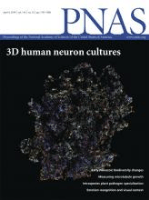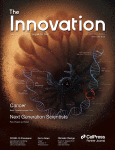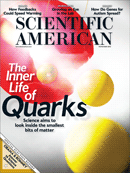
PROCEEDINGS OF THE NATIONAL ACADEMY OF SCIENCES OF THE UNITED STATES OF AMERICA
Scope & Guideline
Fostering Breakthroughs in Multidisciplinary Research
Introduction
Aims and Scopes
- Interdisciplinary Research:
PNAS publishes research that integrates multiple disciplines, reflecting the interconnected nature of scientific inquiry. This includes studies that combine biology, chemistry, physics, and social sciences to provide holistic insights. - Innovative Methodologies:
The journal emphasizes the use of advanced methodologies in research, including high-throughput technologies, computational models, and novel experimental techniques, which enhance the ability to explore complex scientific problems. - Global Impact Studies:
Research published in PNAS often focuses on global challenges such as climate change, public health crises, and biodiversity loss, providing insights that can inform policy and practice at national and international levels. - High-Quality Basic and Applied Research:
The journal publishes both fundamental studies that advance theoretical understanding and applied research that addresses practical problems, showcasing a wide array of scientific achievements. - Robust Peer Review Process:
PNAS maintains a rigorous peer review process to ensure that published research is of high quality, contributing to the credibility and reliability of the findings presented.
Trending and Emerging
- Climate Change and Environmental Science:
Research addressing the impacts of climate change, including studies on biodiversity loss, ecosystem resilience, and sustainable practices, has surged. This reflects a growing recognition of the urgency of environmental challenges. - Health and Disease Mechanisms:
Emerging themes in health research, particularly related to infectious diseases (such as COVID-19) and chronic conditions, showcase a trend towards understanding the molecular and systemic mechanisms underlying diseases. - Neuroscience and Behavioral Studies:
There is an increasing focus on understanding the neural basis of behavior, cognition, and mental health, highlighting the interplay between biology and psychology in addressing complex human conditions. - Technological Innovations in Research:
The incorporation of advanced technologies such as CRISPR, synthetic biology, and artificial intelligence in various fields is rapidly expanding. This trend is indicative of a shift towards more innovative and efficient research methodologies. - Social Sciences and Policy Impact:
Research exploring the intersections of science with social issues, such as inequality, public health, and environmental justice, is gaining traction. This reflects an emphasis on how scientific findings can inform policy and societal change.
Declining or Waning
- Traditional Ecology Studies:
Research focused solely on traditional ecological studies, without integrating modern technological approaches or interdisciplinary perspectives, appears to be waning. This shift may be due to the increasing complexity of ecological research requiring more integrative methodologies. - Basic Molecular Biology Studies:
While foundational research remains crucial, there has been a noted decline in studies that do not translate into practical applications or interdisciplinary insights, as the focus shifts towards applied and translational research. - Studies Lacking Policy Relevance:
Research that does not directly address or inform pressing global challenges, such as climate change or public health, is becoming less favored, as funding agencies and journals prioritize work with clear societal impacts. - Narrowly Focused Animal Studies:
Research limited to specific animal models without broader ecological or evolutionary context has seen a decrease, as there is a growing emphasis on studies that connect findings across various species and ecosystems.
Similar Journals

Nature Communications
Exploring the Frontiers of Biochemistry, Chemistry, and PhysicsNature Communications is a premier open-access journal published by NATURE PORTFOLIO, distinguished for its broad scope encompassing Biochemistry, Genetics and Molecular Biology, Chemistry, and Physics and Astronomy. With a remarkable impact factor, this journal has achieved Q1 status in multiple disciplines, reflecting its pivotal role in disseminating high-quality research. Since its establishment, it has provided a vital platform for innovative and interdisciplinary studies, fostering collaboration among scientists worldwide. Situated in the United Kingdom, it has rapidly gained recognition, ranking 7th in Global Physics and Astronomy and Biochemistry, as well as 16th in Chemistry according to Scopus metrics. Accessible since 2015, Nature Communications facilitates the sharing of groundbreaking ideas, making it an invaluable resource for researchers, professionals, and students aiming to stay at the forefront of scientific discovery.

Innovation
Advancing Knowledge Through Multidisciplinary InnovationInnovation is an esteemed open-access journal published by CELL PRESS that has emerged as a leading platform for multidisciplinary research since its inception in 2020. With an impressive Scopus rank of #3 out of 171 in the multidisciplinary category and a notable impact factor placing it in the 98th percentile, the journal has quickly established itself as a crucial resource for researchers and professionals seeking to disseminate groundbreaking ideas and developments across various fields. Located in the United States, at 50 Hampshire St, Floor 5, Cambridge, MA, Innovation aims to foster collaboration and innovation by providing unrestricted access to advanced research. Its commitment to excellence is reflected in its categorization as Q1 in 2023, indicating its high citation and influence within the academic community. The journal invites submissions that push the boundaries of knowledge and encourages scholarly discourse, making it an indispensable resource for students, researchers, and practitioners committed to making impactful contributions to their respective fields.

Natural Sciences
Unveiling the secrets of nature through rigorous research.Natural Sciences is a premier journal published by WILEY, dedicated to advancing the interdisciplinary field of natural sciences through the dissemination of high-quality research. With an ISSN of 2698-6248, this publication features original contributions that explore a wide range of topics including biology, chemistry, physics, and environmental science. Despite the current absence of an impact factor, the journal's commitment to rigorous peer-review ensures the integrity and relevance of its scholarly work. Situated at the forefront of scientific inquiry, Natural Sciences serves as a vital resource for researchers, professionals, and students looking to stay informed about the latest breakthroughs and methodologies in the natural sciences. Emphasizing open access principles, this journal strives to make cutting-edge research readily available to a global audience, fostering collaboration and innovation across disciplines.

Chinese Science Bulletin-Chinese
Exploring the Depths of Chinese Scientific ResearchChinese Science Bulletin-Chinese is a highly regarded multidisciplinary journal published by SCIENCE PRESS, focusing on advancing scientific knowledge across a variety of fields. With an ISSN of 0023-074X and an E-ISSN of 2095-9419, this journal has been in circulation since 1963 and has evolved through several converged years, thus showcasing a rich history of academic contributions. Currently categorized in the prestigious Q2 quartile in Multidisciplinary studies, it ranks #46 out of 171 journals in its category according to Scopus, reflecting its broad influence with a 73rd percentile ranking. While the journal does not offer open access, it remains a critical resource for researchers and professionals seeking to publish high-quality, peer-reviewed research. The journal's objective is to disseminate innovative findings and facilitate knowledge exchange among the scientific community, making it an essential tool for anyone interested in the latest developments in science, particularly within China.

JCOM-Journal of Science Communication
Catalyzing Connections: Enhancing Science CommunicationJCOM - Journal of Science Communication is a premier, peer-reviewed journal dedicated to enhancing the dialogue between science and society. Established in 2002 by the Scuola Internazionale Superiore di Studi Avanzati in Italy, it has become an essential platform for research in the field of science communication, reflecting the growing importance of effective communication in the advancement of scientific knowledge. The journal boasts an impressive Open Access model, encouraging widespread dissemination of critical research findings. With a notable impact in the Communication category, ranking in the Q2 quartile, and achieving a remarkable 77th percentile in Scopus ranks, JCOM positions itself as a crucial resource for scholars, professionals, and students alike. With a broad scope covering interdisciplinary aspects of science communication, the journal aims to foster innovative research and discussions that bridge the gap between scientific communities and the public. Located in Trieste, Italy, JCOM invites contributions that elevate the standards and practices of communicating science in an increasingly complex world.

SCIENTIFIC AMERICAN
Connecting Research with Public CuriositySCIENTIFIC AMERICAN, published by Springer, stands as a prestigious multidisciplinary journal dedicated to disseminating cutting-edge scientific knowledge across a range of fields. Established in 1947, this journal has been integral in bridging the gap between scientific research and public understanding, making complex ideas accessible to a broader audience. With an ISSN of 0036-8733 and E-ISSN of 1946-7087, it maintains a strong standing within the academic community, currently ranked in the Q3 category for its multidisciplinarity, and is positioned at #93 out of 120 in its Scopus ranking, reflecting its valuable contribution to scientific discourse. While the journal is not open access, its long history and commitment to knowledge sharing ensure it remains a vital resource for researchers, professionals, and students alike, fostering a deeper appreciation of science in society.

SCIENCE PROGRESS
Fostering innovation across multidisciplinary research.SCIENCE PROGRESS, published by SAGE Publications Ltd, is a prestigious multidisciplinary journal with an impactful presence in the realm of scientific research. Recognized for its high quality, the journal holds a Q1 status in the 2023 category quartiles and ranks 35th out of 171 in its field, placing it in the 79th percentile within Scopus rankings. With its ISSN 0036-8504 and E-ISSN 2047-7163, SCIENCE PROGRESS has been a pivotal platform since its inception in 1946, fostering innovation and dissemination of knowledge across various scientific disciplines. Based in the United Kingdom, the journal aims to provide a comprehensive arena for researchers and professionals to share groundbreaking findings and insights, contributing to the advancement of scientific progress. Although the journal does not offer open access, it continues to be a vital resource for academics and practitioners alike, maintaining its relevance in a rapidly evolving scientific landscape.

Journal of Obstetrics and Gynecology of India
Transforming Women's Health Through Academic ExcellenceJournal of Obstetrics and Gynecology of India is a leading publication dedicated to the advancement and dissemination of research in the fields of obstetrics and gynecology. Published by SPRINGER INDIA, this journal serves as a vital resource for researchers, clinicians, and students who are keen to stay abreast of the latest developments and innovations in women's health. With an impact factor that reflects its growing influence within the academic community, the journal provides a platform for original research articles, reviews, and clinical studies that contribute to the understanding of complex issues in obstetrics and gynecology. Operating under a Q3 quartile classification for 2023, it ranks 134 out of 209 in the Scopus index, indicating its ongoing commitment to quality and relevance in the medical field. Although currently not open access, the journal encourages the exchange of scientific knowledge and practice, paving the way for future advancements in patient care and women's health. With the convergence of innovative research and clinical practice from 2010 to 2024, the Journal of Obstetrics and Gynecology of India remains a critical resource for those seeking to enhance their expertise and impact in obstetric and gynecological sciences.

Scientific Reports
Your Gateway to Cutting-Edge Scientific Insights.Scientific Reports, published by the esteemed NATURE PORTFOLIO, is a prominent multidisciplinary journal that has been making significant strides in scientific communication since its inception in 2011. With an impressive impact factor and ranked in the Q1 category of multidisciplinary journals, it holds a respected position, placing it at #14 out of 171 according to Scopus rankings, reflecting its high citation rates and robust academic contributions in the 92nd percentile. The journal operates under an Open Access model, enabling broad dissemination of research findings and advancing scientific knowledge globally. Based in the United Kingdom, with offices in Germany, Scientific Reports is committed to publishing high-quality, peer-reviewed research across diverse fields, catering to the needs of researchers, professionals, and students alike, fostering collaboration and innovation in the scientific community.

Heliyon
Fostering global engagement with groundbreaking scientific insights.Heliyon is a distinguished open access journal published by CELL PRESS, headquartered in the Netherlands, that has been advancing the dissemination of scientific knowledge since 2015. With its innovative multidisciplinary approach, Heliyon has garnered significant recognition in the academic community, maintaining a prominent position as evidenced by its Q1 ranking in the multidisciplinary category for 2023, placing it at the forefront of its field. It boasts an impressive Scopus rank of #31 out of 171 journals, ranking in the 82nd percentile, underscoring its influence and reach among scholars and practitioners alike. Committed to providing a platform for diverse research, Heliyon not only facilitates the publication of high-quality research but also ensures that it is broadly accessible, enhancing visibility and engagement from a global audience. This journal is an invaluable resource for researchers, professionals, and students dedicated to interdisciplinary collaboration and innovation.